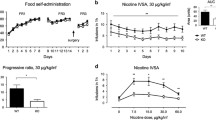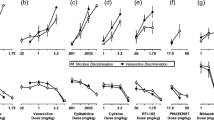Abstract
Rationale
Previous studies have suggested that a knockout of the gene coding for α7 nicotinic receptor subunits influences the behaviour of undrugged mice but not the acute effect of nicotine on locomotor activity.
Objectives
The present studies extend these observations to nicotine tolerance assessed by means of schedule-controlled behaviour.
Methods
Groups of α7−/− and α7+/+ mice were trained to press levers under an FR20 schedule of food reinforcement. The acute response rate-depressant effects of nicotine were determined in both genotypes and the mice were then subdivided into groups treated daily with nicotine (1.2 mg/kg/day) or saline. After 39 days of exposure to this regimen, the dose–response curves were re-determined.
Results
Knockout of the α7 gene had no consistent effect on the lever-pressing behaviour of undrugged mice and did not influence the acute, dose-related, response rate-depressant effect of nicotine (0.2–1.2 mg/kg). When dose–response curves for nicotine (0.4–2.0 mg/kg) were re-determined after daily dosing with the drug, both wild-type and knockout mice developed similar tolerance to nicotine, as shown by ∼2.5-fold shifts to the right of the dose–response curves.
Conclusions
Nicotinic receptors containing the α7 subunit do not play a significant role in the regulation of the lever-pressing behaviour studied or in the acute behavioural depressant effect of nicotine and the development of tolerance to that effect. Such results contrast with previous reports suggesting profound impairments in sensitivity to nicotine in nicotinic receptor β2−/− mice.



Similar content being viewed by others
References
Caggiula AR, Epstein LH, Antelman SM, Saylor SS, Perkins KA, Knopf S, Stiller R (1991) Conditioned tolerance to the anorectic and corticosterone-elevating effects of nicotine. Pharmacol Biochem Behav 40:53–59
Collins AC, Romm E, Wehner JM (1988) Nicotine tolerance: an analysis of the time course of its development and loss in the rat. Psychopharmacology 96:7–14
Corfield-Sumner K, Stolerman IP (1978) Behavioral tolerance. In: Blackman DE, Sanger DJ (eds) Contemporary research in behavioural pharmacology. Plenum, New York, pp 391–448
Damaj MI, Welch SP, Martin BR (1996) Characterization and modulation of acute tolerance to nicotine in mice. J Pharmacol Exp Ther 277:454–461
Goldberg SR, Risner ME, Stolerman IP, Reavill C, Garcha HS (1989) Nicotine and some related compounds: effects on schedule-controlled behaviour and discriminative properties in rats. Psychopharmacology 97:295–302
Gommans J, Stolerman IP, Shoaib M (2000) Antagonism of the discriminative and aversive stimulus properties of nicotine in C57BL/6J mice. Neuropharmacology 39:2840–2847
Goudie AJ, Emmett-Oglesby MW (1989) Tolerance and sensitization: overview. In: Goudie AJ, Emmett-Oglesby MW (eds) Psychoactive drugs: tolerance and sensitization. Humana Press, Clifton, NJ, pp 1–13
Grottick AJ, Trube G, Corrigall WA, Huwyler J, Malherbe P, Wyler R, Higgins GA (2000) Evidence that nicotinic alpha(7) receptors are not involved in the hyperlocomotor and rewarding effects of nicotine. J Pharmacol Exp Ther 294:1112–1119
Hendry JS, Rosecrans JA (1982) The development of pharmacological tolerance to the effect of nicotine on schedule-controlled responding in mice. Psychopharmacology 77:339–343
Mansvelder HD, McGehee DS (2000) Long-term potentiation of excitatory inputs to brain reward areas by nicotine. Neuron 27:349–357
Markou A, Paterson NE (2001) The nicotinic antagonist methyllycaconitine has differential effects on nicotine self-administration and nicotine withdrawal in the rat. Nicotine Tob Res 3:361–373
Marks MJ, Campbell SM, Romm E, Collins AC (1991) Genotype influences the development of tolerance to nicotine in the mouse. J Pharmacol Exp Ther 259:392–402
McCallum SE, Caggiula AR, Epstein LH, Saylor S, Ploskina T, Sved AF (1999) Mecamylamine blocks the development of tolerance to nicotine in rats: implications for the mechanisms of tolerance. Psychopharmacology 141:332–338
Morrison CF (1967) Effects of nicotine on operant behaviour of rats. Int J Neuropharmacol 6:229–240
Nomikos GG, Hildebrand BE, Panagis G, Svensson TH (1999) Nicotine withdrawal in the rat: role of alpha7 nicotinic receptors in the ventral tegmental area. NeuroReport 10:697–702
Orr-Urtreger A, Goldner FM, Saeki M, Lorenzo I, Goldberg L, De Biasi M, Dani JA, Patrick JW, Beaudet AL (1997) Mice deficient in the alpha7 neuronal nicotinic acetylcholine receptor lack alpha-bungarotoxin binding sites and hippocampal fast nicotinic currents. J Neurosci 17:9165–9171
Panagis G, Kastellakis A, Spyraki C, Nomikos G (2000) Effects of methyllycaconitine (MLA), an alpha7 nicotinic receptor antagonist, on nicotine- and cocaine-induced potentiation of brain stimulation reward. Psychopharmacology 149:388–396
Paylor R, Nguyen M, Crawley JN, Patrick J, Beaudet A, Orr-Urtreger A (1998) Alpha7 nicotinic receptor subunits are not necessary for hippocampal-dependent learning or sensorimotor gating: a behavioral characterization of Acra7-deficient mice. Learn Mem 5:302–316
Picciotto MR, Zoli M, Rimondini R, Léna C, Marubio LM, Pich EM, Fuxe K, Changeux J-P (1998) Acetylcholine receptors containing the β2 subunit are involved in the reinforcing properties of nicotine. Nature 391:173–177
Rosecrans JA, Wiley JL, Bass CE, Karan LD (1995) Nicotine-induced acute tolerance: studies involving schedule-controlled behavior. Brain Res Bull 37:359–362
Shoaib M, Gommans J, Morley A, Stolerman IP, Grailhe R, Changeux J-P (2002) The role of nicotinic receptor beta-2 subunits in nicotine discrimination and conditioned taste aversion. Neuropharmacology 42:530–539
Spealman RD, Goldberg SR, Gardner ML (1981) Behavioral effects of nicotine: schedule-controlled responding by squirrel monkeys. J Pharmacol Exp Ther 216:484–491
Stolerman IP, Fink R, Jarvik ME (1973) Acute and chronic tolerance to nicotine measured by activity in rats. Psychopharmacologia 30:329–342
Stolerman IP, Bunker P, Jarvik ME (1974) Nicotine tolerance in rats: role of dose and dose interval. Psychopharmacologia 34:317–324
Stolerman IP, Chandler CJ, Garcha HS, Newton JM (1997) Selective antagonism of behavioural effects of nicotine by dihydro-β-erythroidine in rats. Psychopharmacology 129:390–397
Stolerman IP, Chamberlain S, Bizarro L, Fernandes C, Schalkwyk L (2004) The role of nicotinic receptor α7 subunits in nicotine discrimination. Neuropharmacology 46:363–371
Tritto T, McCallum SE, Waddle SA, Hutton SR, Paylor R, Collins AC, Marks MJ (2004) Null mutant analysis of responses to nicotine: deletion of β2 nicotinic acetylcholine receptor subunit but not α7 subunit reduces sensitivity to nicotine-induced locomotor depression and hypothermia. Nicotine Tob Res 6:145–157
Tucci SA, Genn RF, File SE (2003) Methyllycaconitine (MLA) blocks the nicotine evoked anxiogenic effect and 5-HT release in the dorsal hippocampus: possible role of alpha7 receptors. Neuropharmacology 44:367–373
Wolgin DL (1989) The role of instrumental learning in behavioral tolerance to drugs. In: Goudie AJ, Emmett-Oglesby MW (eds) Psychoactive drugs: tolerance and sensitization. Humana Press, Clifton, NJ, pp 17–114
Young JW, Finlayson K, Spratt C, Marston HM, Crawford N, Kelly JS, Sharkey J (2004) Nicotine improves sustained attention in mice: evidence for involvement of the alpha7 nicotinic acetylcholine receptor. Neuropsychopharmacology 29:891–900
Acknowledgements
We thank Swital Patel for assistance with some of the experiments and the European Union and the Medical Research Council for financial support.
Author information
Authors and Affiliations
Corresponding author
Additional information
C. Naylor and D. Quarta are listed alphabetically and contributed equally to the work.
Rights and permissions
About this article
Cite this article
Naylor, C., Quarta, D., Fernandes, C. et al. Tolerance to nicotine in mice lacking α7 nicotinic receptors. Psychopharmacology 180, 558–563 (2005). https://doi.org/10.1007/s00213-005-2187-5
Received:
Accepted:
Published:
Issue Date:
DOI: https://doi.org/10.1007/s00213-005-2187-5




